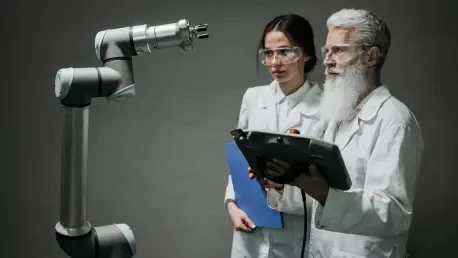Meet Marco Gaietti, a veteran in management consulting with decades of experience shaping the landscape of business management. His deep expertise in strategic management, operations, and customer relations makes him a go-to voice on the evolving challenges organizations face today. In this interview, we dive into the critical intersection of automation and talent development, exploring the hidden risks of replacing entry-level roles with AI, the importance of nurturing future leaders, and how companies can strike a balance between technological efficiency and human potential.
Can you share your perspective on why entry-level roles are so vital for cultivating the next generation of leaders in an organization?
Absolutely. Entry-level roles are often the first real immersion an employee has into a company’s world. They’re where people get hands-on experience with the nuts and bolts of operations, learn the unspoken rules of the culture, and build a foundational understanding of how things work. These positions aren’t just about doing tasks; they’re about absorbing the DNA of the organization. Over time, that exposure turns into institutional knowledge, which is invaluable when someone steps into a leadership role. Without that early grounding, you risk having leaders who lack a deep connection to the company’s history and ways of working.
How do these early roles specifically help employees develop skills that prepare them for higher positions down the line?
Early roles are like a training ground for critical skills. Employees learn problem-solving by tackling real, often messy, challenges. They develop communication skills by interacting with colleagues across departments. They also pick up time management and adaptability, especially in fast-paced or high-pressure environments. More importantly, they gain a sense of accountability—when you’re at the entry level, your mistakes and successes are often very visible, and that teaches responsibility. These are the building blocks for managing teams and making strategic decisions later on.
There’s talk of a ‘pipeline crisis’ when companies automate entry-level jobs. Can you paint a picture of what this crisis might look like for businesses in the future?
This pipeline crisis is essentially a drought of experienced talent ready to step into leadership. When you automate entry-level roles, you’re cutting off the supply of people who would naturally grow into mid-level and senior positions. In the future, companies might find themselves scrambling to fill critical roles with external hires who don’t understand the business’s unique challenges or culture. Internally, you could see stalled decision-making, weaker team cohesion, and even innovation taking a hit because there’s no one with the deep-rooted perspective to guide the ship through complex changes.
What are some of the key factors pushing companies to replace entry-level positions with AI and automation?
The primary driver is often cost efficiency. Automation promises to reduce labor expenses, streamline repetitive tasks, and boost productivity in the short term, which is incredibly appealing to executives under pressure to show quick results. But it’s not just about dollars and cents. Some companies are also chasing consistency—machines don’t get tired or make human errors. Others see automation as a way to stay competitive in industries where tech adoption is a benchmark for innovation. The challenge is that these motivations often overshadow the long-term implications of losing human talent at the ground level.
How do you think company leaders balance the immediate financial benefits of automation against the potential risks it poses to leadership development?
It’s a tough juggling act. Many leaders are swayed by the upfront savings and efficiency gains, especially when they’re answering to boards or shareholders focused on quarterly results. But the savvier ones are starting to ask harder questions: What does our talent pipeline look like in five or ten years? Can we afford to lose the human insight that comes from early-career roles? I think the best approach is a hybrid mindset—invest in automation for rote tasks, but protect and redesign entry-level roles to focus on skills that AI can’t replicate, like critical thinking and relationship-building. It’s about playing the long game.
Why do you think younger, entry-level employees are often seen as critical assets in a tech-driven business landscape?
Younger employees tend to be digital natives—they’ve grown up with technology, so they adapt to new tools and systems with ease. They’re not just quick learners; they’re also less resistant to change compared to some seasoned professionals who might be set in their ways. This agility makes them invaluable in environments where AI and automation are being rolled out at a rapid pace. They can bridge the gap between tech and human processes, often spotting ways to integrate systems that others might overlook.
How can companies redesign entry-level roles to complement automation rather than be replaced by it?
It’s about rethinking what entry-level means in an AI era. Instead of having these employees handle repetitive data entry or basic processing—tasks AI can do better—shift their focus to areas like interpreting data outputs, troubleshooting tech issues, or engaging with clients to gather feedback that feeds into system improvements. These roles can also emphasize soft skills, like collaborating across teams or training others on new tools. The key is to design positions that expose employees to both technology and the human side of the business, ensuring they’re still learning and growing.
What advice do you have for our readers who are navigating the balance between automation and talent development in their organizations?
My advice is to think strategically, not just reactively. Automation is a powerful tool, but it’s not a replacement for human potential. Take a hard look at your entry-level roles and ask how they can evolve to support both your tech investments and your leadership pipeline. Invest in training programs that help early-career employees build skills AI can’t touch—empathy, creativity, strategic thinking. And don’t just chase short-term savings; build a culture that values growth and adaptability. If you nurture your talent from the ground up, you’ll be better equipped to handle whatever the future throws at you.









